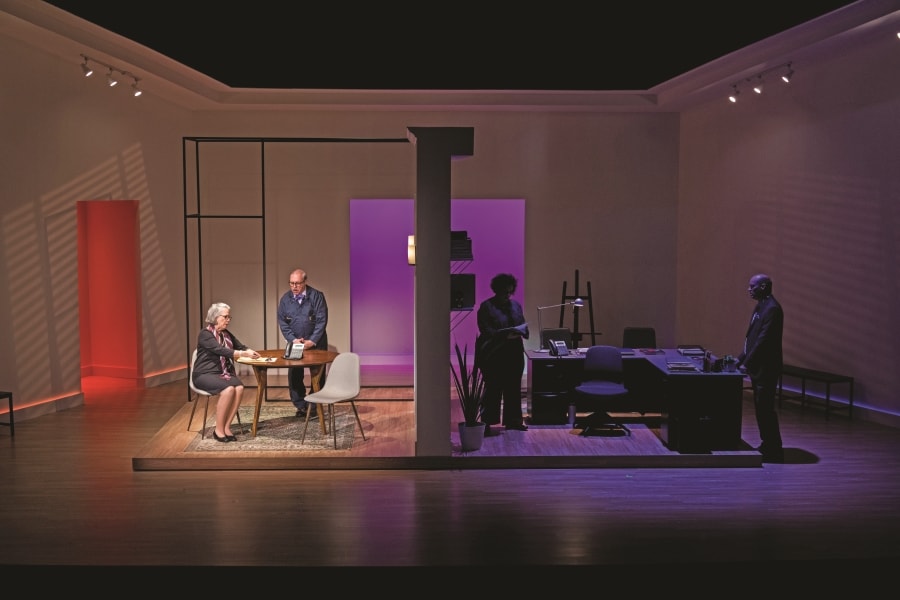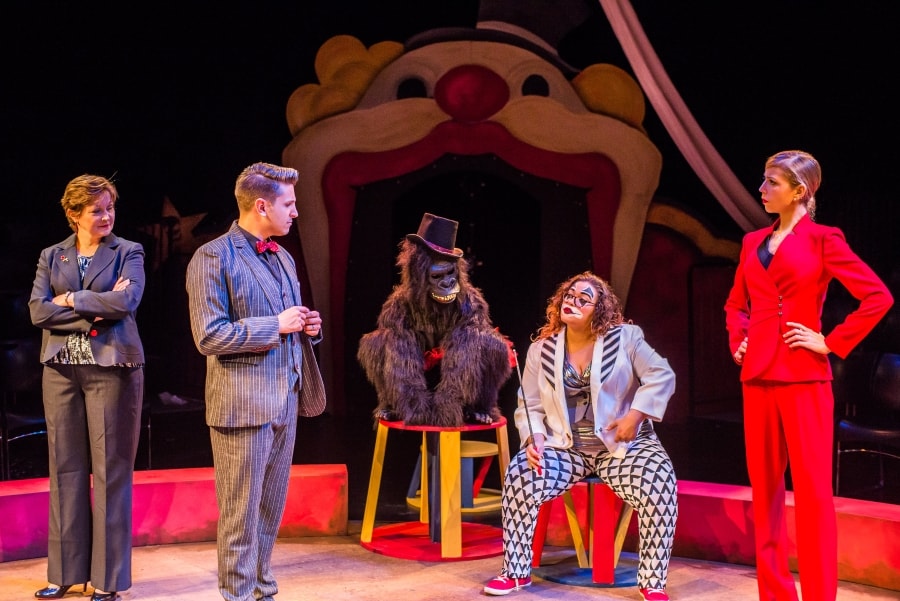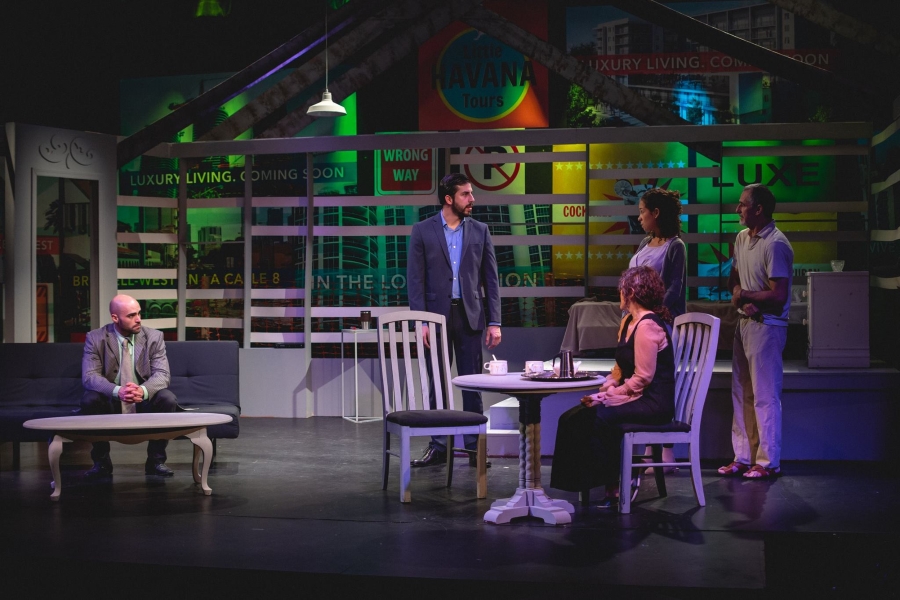Miami is dramatic. Her bougainvillea flowers (have you seen them?) blare their horns in fuchsia and orange. Her evenings go late, blinking through the darkness until the sun outshines night’s stars.
It’s not surprising, then, that the curtain rises here with flair, and it speaks in many tongues: immersive, proscenium, experiential, English, Spanish, Spanglish, Creole. You name it, Miami speaks it, translates it, writes, and performs it. Theatre is alive here and the stage is the city itself. (Theatre Communications Group, this magazine’s publisher, will host annual theatre conference in Miami June 5-7.)
There are about 80 theatres working out of South Florida and more than half of them are in Miami proper, according to the South Florida Theatre League. Most recently, things that once hindered theatrical growth seem to have fed it. The arts have always had to compete with the weather; now theatre embraces that tension, wrapping itself around the city and its many neighborhoods. Indeed, because there is no single theatre district, people have to travel to different neighborhoods to watch shows. But this also means that writers, directors, producers, and audiences pick up the particular nuance of each of those neighborhoods as they write, make, and watch the work. Miami is finally using her warmth and color in her favor, theatrically speaking.
Spots like the Sandrell Rivers Theater houses both Fantasy Theatre Factory, one of Miami’s most well-known children’s theatre companies, and the M Ensemble, Florida’s longest-running African American theatre organization.
Taking into consideration that Miami is 70 percent Hispanic and/or Latinx, according to the 2019 census, it makes sense that the most important theatre coming out of Miami right now records and illuminates that linguistic and cultural community. Miami New Drama is probably the theatre that most exemplifies the city right now. It’s run by Michel Hausmann, a Venezuelan director who studied at Columbia University and ended up in Miami because his theatre in Caracas was tear-gassed during a production of Jesus Christ Superstar. That wasn’t the only reason Hausmann left Venezuela, but it was the final push out by a government that was (is) trying to silence its people. When artists are silenced by dictators like Chávez or Maduro, who squeeze powerful voices into corners, they have a way of finding their way to Miami. Once there, they raise the volume and light the flare, bright as the bougainvillea—a flare that says, “Look here, look there, look at what’s happening in our countries, and look at what’s happening here.”
Miami is “the exile capital of the world,” according to Hausmann. He and others like him are on a mission to put the stories of the city’s people centerstage. The Miami of today, Hausmann says, is the “America of tomorrow.”

One of the stories Miami New Drama recently mounted was Carmen Peláez’s play Fake, which was inspired by Peláez’s great aunt, the famous Cuban painter Amelia Peláez. The play digs its brush into the thick, oily mess of authenticity and covers the canvas in more questions, leaving the audience to answer: Who writes history? How does one create legacy? And at what cost?
Fake is a play that couldn’t have premiered anywhere but Miami. Not yet. That “not yet” is important, because Miami theatre is providing the training wheels for a ride the rest of the country needs to take—a journey to understand what it means to root a voice in a place of authenticity.
“Miami is the city of the Other,” says Peláez. “Every immigrant coming from Latin America and the Caribbean crashes on our shores, which means Miami may talk with an accent, but it doesn’t think with one.” In her play, the Latino doesn’t just play the janitor, and the Latina plays the boss. “We don’t have to explain or defend our stories here, because this city doesn’t mold you into a preconceived box to check off,” Peláez adds.
On the street and in people’s homes, English and Spanish commingle, though that has not always been so in the theatre—not even in Miami. Spanish-speaking audiences pack houses night after night all along Calle Ocho, or 8th street, Miami’s main Hispanic drag. The street is lined with busts of José Martí, Cuba’s national hero, alongside new waves of Central Americans who enter the city daily, adding to the fabric. In the past, those packed houses lived in a vacuum, in the productions of Miami’s golden boy, Nilo Cruz, or in the bursts of festivals like Teatro Avante’s spectacular and yearly International Hispanic Theatre Festival of Miami, which has been running for more than three decades.
That vacuum, though, has recently been filled. Places like Microteatro, featuring short plays in old shipping containers, are creating programming like I Am Miami, in both English and Spanish.
People like Edgar Garcia (no relation to this author) are also changing the game. As the new artistic director of Prometeo Theatre, a Spanish-language theatre that’s been around for 45 years, Garcia sees the value of merging English and Spanish onstage, bringing together the two communities. “Language should not be divisive but, on the contrary, create hunger for expansion. Why is Spanglish considered a lesser way of communication?” Garcia asks rhetorically. These are the questions he hopes to explore onstage in future multilingual productions.
Prometeo’s spring show this year is a musical called La Verdadera Historia de Pedro Navaja, one of Latin America’s most popular musicals—a mash-up of John Gay’s The Beggar’s Opera and Rubén Blades’s song “Pedro Navaja.” With a book by Pablo Cabrera and music by Pedro Rivera Toledo, the show circles around media manipulation, and its narrator, the anti-hero, is a street hustler from Calle Ocho.
“The new wave of immigration, forced by nature, politics, and/or social issues, has made Miami a focal point for art,” says Garcia, who found himself in Miami after Hurricane Maria devasted Puerto Rico in 2017. He’d been artistic director of the University of Puerto Rico’s Repertory Theatre for seven years. “My students went from memorizing plays to sleeping without a roof in one day,” he says. When Miami called, he followed her voice.
As theatremakers like Garcia and Hausmann make their way into the city, others make their way out—at least creatively. “The hallmark of a great theatre region is its ability to create and export new work,” says Christopher Demos-Brown, one of the Miami scene’s most well-known playwrights. His play American Son ran on Broadway this season. Set in Miami, the play takes the pulse of our legal system, black/white race relations, and the undercurrents that both bind and tear us apart. The play starred Kerry Washington and Steven Pasquale, and among its starry producing team, including Gabrielle Union, Shonda Rhimes, and Jada Pinkett Smith, was Miami’s own William “Willie” Fernandez, who left the newspaper business to follow theatre, and who, among other accolades, has a 2012 Pulitzer under his belt for Public Service.
As for Demos-Brown, he’s multifaceted, practicing law by day and continuing his role as a true son of the Miami theatre scene by night. His playwriting career was born here, and to a certain degree was ignited by his own spark. He is one of the founders of Zoetic Stage, which runs out of the Adrienne Arsht Center, the city’s official performing arts center. Zoetic’s cofounders are Brown’s wife, Stephanie, the playwright Michael McKeever, artistic director Stuart Meltzer, and Kerry Shiller. The team started Zoetic with the simple goal, says Meltzer, of “telling stories well.” And that is what they’ve done. Year after year, they are nominated for and win Carbonell Awards, the city’s highest regional theatre honors. They’ve produced plays as varied as McKeever’s Moscow and South Beach Babylon, as well as Pinter, Fun Home, and Elena Maria Garcia’s one-woman show ¡FUACATA! or a Latina’s Guide to Surviving the Universe.

Apart from the support Demos-Brown received from his colleagues, he is also a product of the city’s artistic incubators, which are a big part of why Miami’s theatre scene is booming. American Son was developed at Miami Dade County’s Playwright Development Program, which is constantly adding new gems to Miami’s crown. Recent graduates of the program to watch for are playwrights Hannah Benitez and William Hector. Benitez has just been commissioned by Zoetic for Gringolandia (set to open in 2020), a play about a 50-year-old man who returns to his native Cuba to find his deceased mother’s piano and play it once last time. “It’s a play about closure, under the guise of a cultural identity play,” says Benitez.
Meanwhile Hector has just won a $75,000 grant from the Knight Foundation for a piece called G7: 2070, also to premiere in 2020. The play will be directed by Victoria Collado, another of Miami’s brilliant native daughters. Most recently she assistant-directed John Leguizamo on Broadway, and recently directed a piece I wrote called Amparo, an experiential theatre piece in downtown Miami about the layered truths behind Cuba’s most controversial rum, Havana Club.
As for G7:2070, it’s set in the future—appropriately so, as many might say it represents the future of Miami theatre. This immersive theatrical summit invites audience members to become delegates and join the dignitaries of the seven most powerful nations—the United States, the European Papal Federation, Imperial China, Ethiopia, Uruguay, Russia, and Disney—as they gather in a post-sea-level-rise Miami to decide the fate of the world. It will premiere at the Kampong, the historic home of David Fairchild, an American botanist and explorer who died in Miami’s Coconut Grove neighborhood in 1954.
Apart from the Playwright Development Program, other local incubators include theatres like City Theatre, whose yearly national award for short playwriting is consistently responsible for discovering new talent. The company, most known for Summer Shorts, also creates Winter Shorts, Short Cuts, Shorts Gone Wild, and most recently She Shorts. Susan Westfall, the company’s co-founder, has been a consistent supporter of female talent, before “supporting women” was even a thing. In addition, the company runs CityWrights, a conference that has been connecting Miami artists to the world for 25 years, bringing theatre pros from around the globe, recently including writers like Lauren Gunderson, Leslie Ayvazian, and Lauren Yee.

Alongside Westfall is Margaret Ledford, City Theatre’s artistic director, who is one of Miami’s sharpest directors, comfortable in both the commercial and nonprofit realms and a doula of new work. As one of the founding members of the Mangrove Creative Collective, she helps bring fauny, funny, and fantastic Florida to life. Mangrove’s mission is to tell Florida stories that have yet to be told with universal themes that will appeal to a broad audience. They seek to create unique art through innovative storytelling and to collaborate with artists of varying backgrounds and abilities. In 2014, they developed playwright Juan C. Sanchez’s play Paradise Motel, which eventually evolved into Miami Motel Stories, produced by Juggerknot Theatre Company, and which has, over the past two years, been taking root in motel rooms across the city, from Little Havana to the MiMo neighborhood, peeling back the layers of the city, one room at a time.
Currently Mangrove is working on Tangled Roots by Matt Stabile, a piece whose development process has been as fascinating as the piece itself. In 2018 the theatre gathered artists from varying fields—puppeteers, dancers, writers, performers, you name it—for a weekend, gave them a draft of the scripts, and said: Play! “Basically, it is about releasing the idea of ‘ownership’ from the writer and handing it over to the group,” says Stabile.
It is perhaps this that is allowing Miami to shine—that the community is both so specific and so representative of what’s going on in the world as a whole. This is, after all, the city that gave birth to talents like Tarell Alvin McCraney, Marco Ramirez, and Lauren Feldmen, to name a few.
Christine Dolen, who has been writing about theatre in Miami since 1979, sees the future of the scene as living on the edge. “I think the theatre here will get ever more daring and experimental,” Dolen says. “I see multidisciplinary work growing. I see plays by South Florida playwrights being done at more theatres around the United States.”
For William Hector, the city is great fodder and inspiration. Miami, he notes, is “a city where the story of a man carrying a shark onto the Metrorail was widely known. A city where by third grade I was roughly familiar with the concept of Medicare fraud. A city where, in the ’70s, an errant pigeon once violently and messily died in the bungalow my mother was renting, and the painters she hired to clean up assured her they were very experienced in dealing with blood stains.”
It’s also the city where people whose theatres have been tear-gassed find new homes, where the immigrant seeks a new life and the refugee finds shelter. It is America’s best possible future. And if the play’s the thing, Miami is the place to play. “Give a platform to the voices we have not heard from,” says Edgar Garcia. “And if the voices are heard, the issues are talked about and solutions might come. It is what we do.”
Vanessa Garcia is a playwright, novelist, and journalist. Her novel White Light was one of NPR’s Best Books of 2015. Her most recent play, Amparo, is now showing in Miami.


